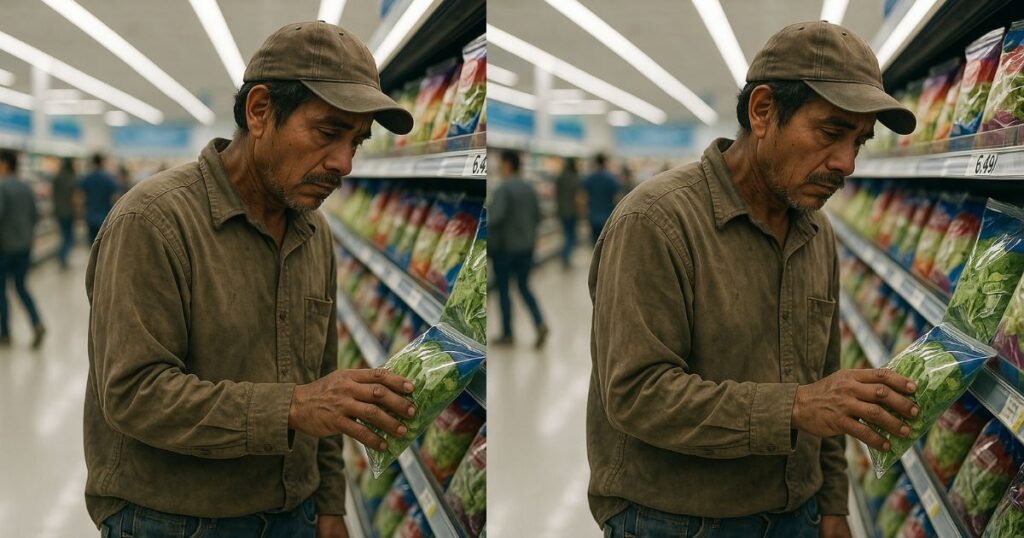But the foreman didn’t stop the crew. He just waved someone over to drag me to the side. That was the rule—you don’t stop for one man when there’s a shipment deadline.
I woke up hours later under the back of a pickup truck, skin caked in dust, vision blurry. One of the older women, Rosa, had poured a little water into my mouth. Not clean water—just what she had left in her bottle. She rubbed my chest with alcohol and whispered prayers.
I don’t remember what hurt more—my body, or the realization that I wasn’t even worth a call to an ambulance.
They dropped me off at a clinic in Fresno after the shift. Cash-only. No ID, no questions. The nurse said it was heatstroke and told me I was lucky. Gave me ibuprofen and a half-filled IV bag. I left before the sun rose, walked five miles to a gas station, and sat on the curb till my cousin came with the car.
I didn’t cry. I just stared at the asphalt, thinking about all the things I wouldn’t do with my life.
I wasn’t supposed to end up like this. I’d wanted to be a mechanic. Fix engines. Build something. But every time I got close to saving for school, something broke—the truck, my mother’s hip, a cousin’s funeral back home. Life always had other plans.
I returned to the fields the next day. Not because I was healed—but because I couldn’t afford not to.
That’s how it works for people like me. You keep showing up. Even broken.
Years passed. The machines got faster. The crates got heavier. The pay didn’t change.
I remember one foreman bragging he’d replaced twenty men with one harvester. Said it with a grin, like he’d cured cancer. He never looked at the men packing up their gloves in silence.
There were days we sat on the edge of the field, staring out past the horizon, eating tortillas with salt. Rosa told stories about Veracruz. Julio talked about his kids in Modesto, how one of them got straight As. Said he’d never let them near a knife or a field.
I nodded. But I didn’t have kids. Or a wife. Just a small room, a worn-out Bible, and fingers that ached in the cold.
Still, there was something honest in the work.
You put in the hours. The sun scorched you equal. The dirt didn’t care who you were. The rows were long, and so were the days, but there was dignity in the sweat—until they took even that.
It ended one October morning.
We’d shown up at dawn to find a line of trucks and two new machines parked like sentries. They didn’t even give us the chance to work. The supervisor handed out final checks—pink slips for the brown-skinned.
No severance. No warning. Just a cold “you’re not needed anymore.”
Julio cursed under his breath. Rosa cried. I just stood there, holding my gloves, wondering what a man becomes when his only trade is no longer wanted.
I drifted for a while after that. Took odd jobs—dishwashing, patching tires, painting fences under the table. Nothing stuck. Nothing paid enough.
But I still kept my knife.
The one with the duct-taped handle.
Sometimes I’d take it out and hold it, like an old soldier touching his rifle. Not because I missed the pain—but because it reminded me I once mattered. I once worked.
A few months ago, I walked into a farmers’ market downtown. Just to look. Everything smelled fresh. There were jars of honey with ribbons, hand-written chalk prices, and people wearing wide-brimmed hats sipping oat milk lattes. A young couple stood at a stall holding a baby and debating between arugula and spinach.
I looked at the sign:
“Local Organic Romaine – $7 per bag.”
Seven dollars.
I stepped closer, just to see. And I recognized the farm name. It was one I’d worked years ago. Same soil. Same sun. Just different hands now. Cleaner ones. More approved.
The vendor smiled at me, friendly. “Looking for greens?”
I nodded, then shook my head.
“No,” I said. “Just remembering.”
She tilted her head. “You from around here?”
I almost said no. But something in me cracked.
“I picked for Reyes Farms back in the day,” I said. “Before they went all organic and fancy.”
She blinked. “Oh… wow.”
Silence hung there.
Then she whispered, almost too softly: “Thank you.”
And for a second—I swear—I saw something like understanding in her face. Not pity. Just a flicker. A glimpse of the chain.
I walked home empty-handed. But not bitter.
Just tired. And a little proud.
Because I may never have eaten the salad. But I grew it.
I carved it out of the earth with hands no one sees anymore. And maybe… just maybe… someone finally saw.


